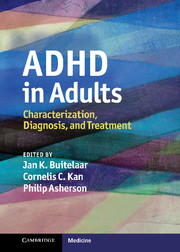19 results
Mindfulness-Based Cognitive Therapy v. treatment as usual in adults with ADHD: a multicentre, single-blind, randomised controlled trial – ERRATUM
-
- Journal:
- Psychological Medicine / Volume 48 / Issue 11 / August 2018
- Published online by Cambridge University Press:
- 15 April 2018, p. 1920
-
- Article
-
- You have access
- HTML
- Export citation
Mindfulness-based cognitive therapy v. treatment as usual in adults with ADHD: a multicentre, single-blind, randomised controlled trial
-
- Journal:
- Psychological Medicine / Volume 49 / Issue 1 / January 2019
- Published online by Cambridge University Press:
- 28 February 2018, pp. 55-65
-
- Article
- Export citation
Section 7 - Alternative biological treatments
-
- Book:
- ADHD in Adults
- Published online:
- 04 April 2011
- Print publication:
- 03 March 2011, pp 271-304
-
- Chapter
- Export citation
Contents
-
- Book:
- ADHD in Adults
- Published online:
- 04 April 2011
- Print publication:
- 03 March 2011, pp v-vi
-
- Chapter
- Export citation
Section 4 - Comorbidities of adult ADHD
-
- Book:
- ADHD in Adults
- Published online:
- 04 April 2011
- Print publication:
- 03 March 2011, pp 121-190
-
- Chapter
- Export citation
ADHD in Adults - Title page
-
-
- Book:
- ADHD in Adults
- Published online:
- 04 April 2011
- Print publication:
- 03 March 2011, pp iii-iii
-
- Chapter
- Export citation
Section 3 - Assessment and diagnosis of adult ADHD
-
- Book:
- ADHD in Adults
- Published online:
- 04 April 2011
- Print publication:
- 03 March 2011, pp 91-120
-
- Chapter
- Export citation
Section 5 - Pharmacological treatment of adult ADHD
-
- Book:
- ADHD in Adults
- Published online:
- 04 April 2011
- Print publication:
- 03 March 2011, pp 191-239
-
- Chapter
- Export citation
ADHD in Adults - Half title page
-
- Book:
- ADHD in Adults
- Published online:
- 04 April 2011
- Print publication:
- 03 March 2011, pp i-ii
-
- Chapter
- Export citation
Copyright page
-
- Book:
- ADHD in Adults
- Published online:
- 04 April 2011
- Print publication:
- 03 March 2011, pp iv-iv
-
- Chapter
- Export citation
Index
-
- Book:
- ADHD in Adults
- Published online:
- 04 April 2011
- Print publication:
- 03 March 2011, pp 309-314
-
- Chapter
- Export citation
Contributors
-
-
- Book:
- ADHD in Adults
- Published online:
- 04 April 2011
- Print publication:
- 03 March 2011, pp vii-ix
-
- Chapter
- Export citation

ADHD in Adults
- Characterization, Diagnosis, and Treatment
-
- Published online:
- 04 April 2011
- Print publication:
- 03 March 2011
Preface
-
-
- Book:
- ADHD in Adults
- Published online:
- 04 April 2011
- Print publication:
- 03 March 2011, pp x-xii
-
- Chapter
- Export citation
Section 2 - Insights into the pathophysiology of ADHD in adults
-
- Book:
- ADHD in Adults
- Published online:
- 04 April 2011
- Print publication:
- 03 March 2011, pp 25-90
-
- Chapter
- Export citation
Appendix 1: - Patient organizations for ADHD (countries in alphabetical order)
-
- Book:
- ADHD in Adults
- Published online:
- 04 April 2011
- Print publication:
- 03 March 2011, pp 305-307
-
- Chapter
- Export citation
Appendix 2: - Useful websites for ADHD (in alphabetical order)
-
- Book:
- ADHD in Adults
- Published online:
- 04 April 2011
- Print publication:
- 03 March 2011, pp 308-308
-
- Chapter
- Export citation
Section 1 - The development of adult ADHD as an epidemiological concept
-
- Book:
- ADHD in Adults
- Published online:
- 04 April 2011
- Print publication:
- 03 March 2011, pp 1-24
-
- Chapter
- Export citation
Section 6 - Psychological and social treatment strategies for adult ADHD
-
- Book:
- ADHD in Adults
- Published online:
- 04 April 2011
- Print publication:
- 03 March 2011, pp 240-270
-
- Chapter
- Export citation



